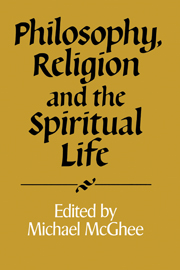Book contents
- Frontmatter
- Contents
- Introduction
- Philosophy and Religion in the Thought of Kierkegaard
- De Consolatione Philosophiae
- The real or the Real? Chardin or Rothko?
- Love and Attention
- Descartes' Debt to Augustine
- Visions of the Self in Late Medieval Christianity: Some Cross-Disciplinary Reflections
- Refined and Crass Supernaturalism
- Religious Imagination
- Moral Values as Religious Absolutes
- Revealing the Scapegoat Mechanism: Christianity after Girard
- Philosophy vs. Mysticism: an Islamic Controversy
- Non-Conceptuality, Critical Reasoning and Religious Experience: Some Tibetan Buddhist Discussions
- ‘Know Thyself’: What Kind of an Injunction?
- Facing Truths: Ethics and the Spiritual Life
- Notes on Contributors
- Index
Religious Imagination
Published online by Cambridge University Press: 04 August 2010
- Frontmatter
- Contents
- Introduction
- Philosophy and Religion in the Thought of Kierkegaard
- De Consolatione Philosophiae
- The real or the Real? Chardin or Rothko?
- Love and Attention
- Descartes' Debt to Augustine
- Visions of the Self in Late Medieval Christianity: Some Cross-Disciplinary Reflections
- Refined and Crass Supernaturalism
- Religious Imagination
- Moral Values as Religious Absolutes
- Revealing the Scapegoat Mechanism: Christianity after Girard
- Philosophy vs. Mysticism: an Islamic Controversy
- Non-Conceptuality, Critical Reasoning and Religious Experience: Some Tibetan Buddhist Discussions
- ‘Know Thyself’: What Kind of an Injunction?
- Facing Truths: Ethics and the Spiritual Life
- Notes on Contributors
- Index
Summary
In some recent theological writing, imagination is presented as a power of the mind with crucial importance for religion, but one whose role has often suffered neglect. Its fuller acknowledgment has become a live issue today. ‘Theologians’, wrote Professor J. P. Mackey, ‘have recently taken to symbol and metaphor, poetry and story, with an enthusiasm which contrasts very strikingly with their all-but-recent avoidance of such matters’ (1986, p. 1). As well as relevant writings by Eliade and Ricoeur, there have been treatments of religious imagination by Professor John McIntyre in his Faith, Theology and Imagination (1987) and in J. P. Mackey's composite volume entitled Religious Imagination.
What is beyond all question is that in the field of religion, imagination must be accorded an enormous role, seen as an indispensable agency without which the claims and teachings of religion could never be communicated at all—far less arrestingly or memorably expressed. It is imagination that carries the worshipper from the crucifix held in his hand, from the icon on the wall, from the fragment of bread and the sip of wine—to the thought of salvific events and transactions, on a cosmic scale and with a cosmos-transcending being. Imagination can, nevertheless, also be an all too willing religious worker, too ready to leap abysses in understanding and argumentation over contestable religious concepts and claims.
- Type
- Chapter
- Information
- Philosophy, Religion and the Spiritual Life , pp. 127 - 144Publisher: Cambridge University PressPrint publication year: 1992



